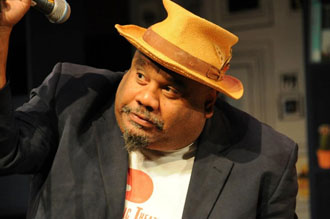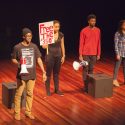Stew brings passion, energy to classroom
Stew — just Stew — walks into the classroom in black clothes, red sneakers and a battered straw hat. He carries a guitar case, as if arriving at a coffee shop stage instead of a lecture.

The versatile Stew performs during a visit by actor Patrik-Ian Polk. Photo: Maxwell John Love
A genre-bending artist with roots in rock and punk, his successful career has taken him from underground hot spots to European clubs. Sharing his story took him to Broadway and a collaboration with filmmaker Spike Lee.
As the fall Arts Institute artist in residence, Stew’s course, “Stew’s Song Factory,” blends history, storytelling and examples from Bach to the Geto Boys as students create their own musical expressions.
“He’s here to have this extended conversation — with students, with guest artists, with the community — about all these things that he finds fascinating and challenging, and that he thinks should be brought to light,” says Kate Hewson, coordinator of the arts residency program. “Stew originally proposed a class drawing primarily upon black music history, but it’s ended up having a much more expansive focus.”
As 15 students take their seats across the room, Stew is irreverent but passionate, blending personal stories of life as a working artist with profound nuggets about making an image come alive. He starts with the classics: the Beach Boys and Chuck Berry.
“When they say, ‘Do you wanna dance?’ they’re not saying much. If the song was called ‘Do You Wanna Get Into Hegelian Dialectics?’ they’d have had a harder song to write. You can write a profound, beautiful song out of the simplest daily thing. Emotions are mundane, everyday. What we don’t have is the same way to describe them. So create a song like you talk every day. Suddenly, life fits into those lyrics.”
Stew first came to campus as headliner for the 2010 Line Breaks Festival, coordinated through the Office of Multicultural Arts Initiatives. Curators Lauren Rutlin and Rafael Casal of OMAI booked Stew after seeing his autobiographical Broadway play “Passing Strange,” which was later filmed and released by Spike Lee. Building on Stew’s successful visit, OMAI executive director Willie Ney initiated discussions about a possible residency.
“What I love about Stew: he speaks in very prophetic sentences, almost sound bites,” says Ney. “You want to sit there and write down some of his Stew-ism. He’s bringing exactly what I told him: lots of energy. He teaches things that seem simple and basic, but it’s truth stripped down. That’s what I think Stew’s genius is.”
In UW–Madison’s First Wave Spoken Word and Urban Arts Learning Community, Ney’s students already created groundbreaking performances using words and beats. Yet he wanted to expand their horizons by adding more melody to the words, more storylines to connected songs.
Stew has expressly designed his residency to link students from different worlds: spoken word, classical music, musical theater, drama. The resulting mix has often forced both teacher and students to find new ways to describe what they create. What some consider basic terms — a measure, a bridge — may seem undefined to others, accustomed to different ways of forming their work.
Junior Marissa Reinholz, a viola performance major in the School of Music, enjoys the challenge.
“It’s so difficult, coming from a classical music background,” says Reinholz. “You’re used to performing but not writing.”
Today, Reinholz and three others work on a song describing a blind date. The couple comes from completely different backgrounds, much like the people telling their story.
“‘They’re not meeting each other’s eyes…’ yeah, but we used eyes,” says Ashlyn Elizabeth Akins, a sophomore from the First Wave program.
“Disguise?” Reinholz consults a rhyming dictionary.
“That could work, too — he’s hiding something.” Charles Hughes, a graduate student in history, tests out the rhythm. “‘Duh-duh, duh-duh-duh, dis-GUISE.’”
“It’s such a great number of beats,” says Iris Ceulemans, a senior majoring in trombone performance and composition.“It forces you to be economical.”
“We’ve got to find a word to describe that fourth wall — breaking through,” says Reinholz. “Then we discuss her dress, her clothes. She’s like a Hillary Clinton type. With a pin.”
“‘Her drink is as stiff as her collar,’” says Ceulemans.
“Ooh, that’s good!” Hughes exclaims.
This process, halting at times yet breaking down boundaries, has done exactly what Stew has planned. Though he has taught similar classes in four different university settings, he describes these groups as “the most advanced and ambitious collection of artists.”
“I just want to demystify the process,” says Stew. “Willie Ney had the vision that someone like me would be a challenge. I kept saying, ‘Whatever zone people are in, I want to push them out.’ That was my only caveat.”
True to his own career, Stew’s residency packs in extra content wherever possible. His free Monday series, “Stew and Friends,” brings in 12 world-class performers, all of whom blend multiple artistic streams. In essence, the residency has now become 13 for the price of one.
These artists define the word “diverse.” Multiple performers have created their own shows; many have appeared on Broadway, television and film during the same calendar year. Nearly all have won major awards: Tonys, Obies, Bessies. Eisa Davis, who played Stew’s mother in “Passing Strange,” was a Pulitzer Prize finalist for her play Bulrusher; she is currently appearing in the new TV series “Hart of Dixie.” Paul Oakley Stovall is a playwright and actor who also works for President Obama’s advance team.
And then there’s Taylor Mac, appearing on Monday, Oct. 31 at Vilas Hall’s Mitchell Theatre at 7 p.m.
“Mac has been making a spectacle of himself as one of those uncategorizable talents the city always seems to make room for,” wrote New Yorker critic Hilton Als, describing “The Be(a)st of Taylor Mac” as “an intellectually arduous and beautifully realized piece about the dangers of homogeneity, and what happens to the soul when it forgoes the richness of the imagination.”
“Taylor Mac will be your Halloween,” says Stew. “He will be your trick and your treat.”
In his conversations with these artists, as well as in his own class, Stew is just another student.
“Music puts people on the spot and forces you to get your stuff out there. It’s just as exciting seeing what they’re learning from each other,” he says, surveying the hum of activity.
“It’ll be hell ending this class. We’re going to hit a groove and say, ‘Now we know who we are,’ but have more to say.”

